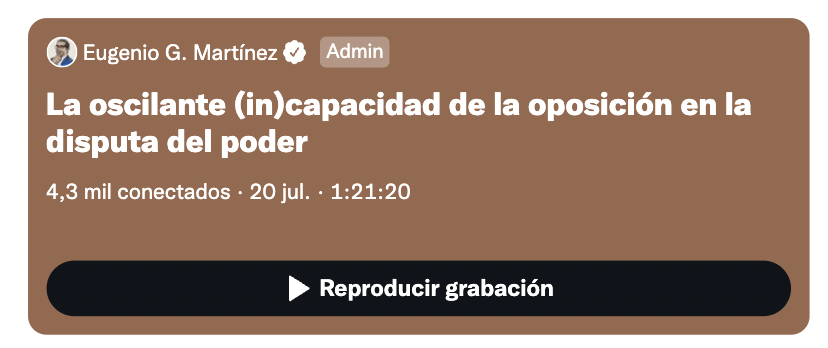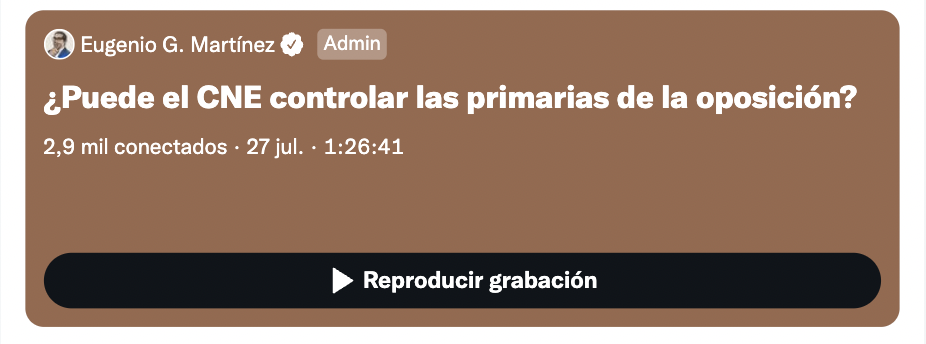The pro-reform sector aligned with Nicol s Maduro’s government, and the Venezuelan opposition wished to resume Mexico talks. However, although the chavista-pro-Maduro’s strategy is very clear in this scenario, the opposition is uncertain about the political roadmap to be established for the 2022-2024 term.
The opposition’s doubts
January 23, 2022, will mark the third year since Juan Guaido’s Interim Government emerged in the Venezuelan political landscape. The enthusiasm aroused by Guaidó among the opposition and independent sectors gave him positive marks of 60% in the first quarter of 2019.
Guaidó’s international support and the strategy to break down the ruling coalition led by the Interim Government resulted in most opposition leaders joining the Interim Government, bypassing the strategy to gather forces (election and demonstration) developed by the Democratic Unity Roundtable (MUD) since 2008.
However, mistakes layered upon mistakes and failures such as the alleged military uprising of April 2019, allegations of corruption in the company Mon meros, the lack of transparency in the management of resources administered by the Interim Government, the manipulated results of the popular referendum of December 2020, its members’ involvement with the so-called Operation Gedeon in May 2020 or the end of the constitutional period of the 2015-elected National Assembly, led to the need to create a new room for debate and collective decisionmaking: Venezuela’s Unity Platform.
However, this instance that must represent the opposition in Mexico has not managed to operate as expected. The causes of this failure can be summarized as follows:
• Non-compliance with the Unity Agreement (signed in August 2020) to approve the standards for decision-making and conflict resolution within the opposition. These standards must be related to those implemented at that time in the Democratic Unity Roundtable.
• The Unity Platform consists of most of the political factors aligned with Guaidó and the Interim Government’s vision. Therefore, before the international allies, there is a clear absence of critical voices or alternative suggestions from the Venezuelan politicians -including the civil society and trade unions- to the vision presented by Popular Will before decision-makers in Washington, Miami, and in some EU countries. In other words, more than a political coordination platform, the Unity Platform has become a social club of the Interim Government.
Specifically, the opposition grouped around Venezuela’s Unity Platform has failed to achieve a unified discourse on essential topics such as voter turnout:
• In mid-2020, the parties and leaders making up the Unity Platform announced that they would not participate in the parliamentary elections held on December 6, 2020.
• In April 2021, the Unity Platform refused to participate in the negotiation to appoint a new National Electoral Council (CNE). In addition, it announced that it would disregard any decision to be taken by the electoral body.
• Although in August 2021 the Unity Platform managed to include some political sectors critical of the Interim Government, their participation in the negotiation process hosted in Mexico has been merely testimonial so far.
• After the beginning of talks in Mexico, the Unity Platform announced that it supported participation in the regional and municipal elections held in November 2021. However, that participation was ensured without appointing a national campaign command, with no strategy nor national message. The Interim Government only expressly endorsed this process for the special election of the governor of Barinas.
• Although on January 3, 2022, the political parties making up the Unity Platform that have representation in the National Assembly supported the continuity of the Interim Government and the 2015-elected National Assembly for another year, the stance of the rest of the organizations and leaders that are theoretically involved in the platform was not known.
• The failed 2022 presidential recall referendum provides a good example of the political-electoral misalignment of the Unity Platform. In the last minute, the support to the process was announced, but the chavismo previously announced the standards that rendered the process unfeasible.
• The Unity Platform does not recognize nor participate in the process of partially renewal of the Supreme Court of Justice (TSJ) undertaken by the chavismo in January 2022.
Guaidó‘s speech on sanctions
Throughout the last month, Guaid has sat down for five interviews with international media. He has spoken specifically with La Tercera (Chile), ABC (Spain), Clar n (Argentina) and Reuters and Bloomberg news agencies.
In an interview with La Tercera (the Chilean newspaper), Guaidó said that one year ago he proposed along with the United States “the possible progressive lifting of sanctions subject to compliance of an agreement”.
In an interview with the ABC (Spain) he highlighted that “economic and diplomatic sanctions and human rights violation are the result of corruption. Sanctions will be lifted progressively subject to the adherence to the agreement signed in Mexico (…) There is willingness to lift sanctions as soon as they are materialized in the agreement signed.”
In the media El Clarin, Guaidó repeated the same arguments used in the ABC (Spain). In this case, it must be specified that although they are different media, they use the same international correspondent.
Guaidó told the Reuter agency that the lifting of sanctions “was not final” and that it could be reversed if chavismo did not return to negotiations.
The most controversial interview was held with Bloomberg, where he said -in contrast with the interviews with newspaper agencies from Chile, Spain, and Argentina- that he was seeing the possibility of proposing the lifting of sanctions to bring Maduro back to Mexico. This time, Guaidó said: “It’s on the table. aimed at strengthening the opposition in its role as interlocutor and the possibility of an agreement.”
However, due to the controversy of this statement, Guaidó wrote on his twitter account: “We ratify our stance and that of our international allies to resume the negotiation table in Mexico as soon as possible to reach a Comprehensive Agreement. The progressive lifting of sanctions is subject to the government agreeing to certain conditions. We are ready to achieve it. We need to make great strides in the agenda to restore democracy, such as the independence of powers, the release of political detainees, and the holding of free and fair elections solving the conflict. Not resuming the negotiation process will increase international pressure on the dictatorship.”
Lifting sanctions: Maduro’s only goal
Upon removing the possibility of holding a recall referendum in 2022, Nicolás Maduro has put the debate where he wants it to be: regaining part of the legitimacy lost and the international recognition by winning the presidential election of 2024.
With the Interim Government internally weakened, the chavismo’s only concern is international isolation, and reducing it will depend on the easing of international sanctions thus repeating part of the strategy developed in 2021: Granting unilateral concessions for the opposition and redefining a new institutional game board, by first renewing the CNE partially and then renewing the Supreme Court of Justice.
The 2022-2024 term is the year of chavismo’s consolidation of power. They ensured their grip on power between 2019 and 2021 despite the precariousness afflicting the country. 2024 is almost upon chavismo and they are really sure of what they need to gain -and what they can yield in Mexico.
As noted in our previous report, at this moment there are three scenarios on the Venezuelan Government’s strategy to address the political roadmap between 2022 and 2024.
1. The analysis of the results of the elections held on November 21, 2021 and on January 9, 2022 forces Maduro to significantly improve his administration if the pro-reform sector maintains the thesis of re-institutionalizing the country and winning governorship through elections.
2. Repeating Nicaragua’s scenario in Venezuela to avoid any electoral compromise as occurred in the regional and municipal elections, especially in the State of Barinas.
3. Forcing the repetition of the 2018 political-electoral scenario in 2024 leading to the holding of presidential elections with the opposition ceasing to participate.
The government’s pro-reform sector supports the efforts to ensure Maduro’s grip on power through the first scenario. However, to enable this scenario, the Venezuelan government needs to resume negotiation talks in Mexico, to help ease international sanctions in exchange for political concessions aiming at the re-institutionalization of the country.






